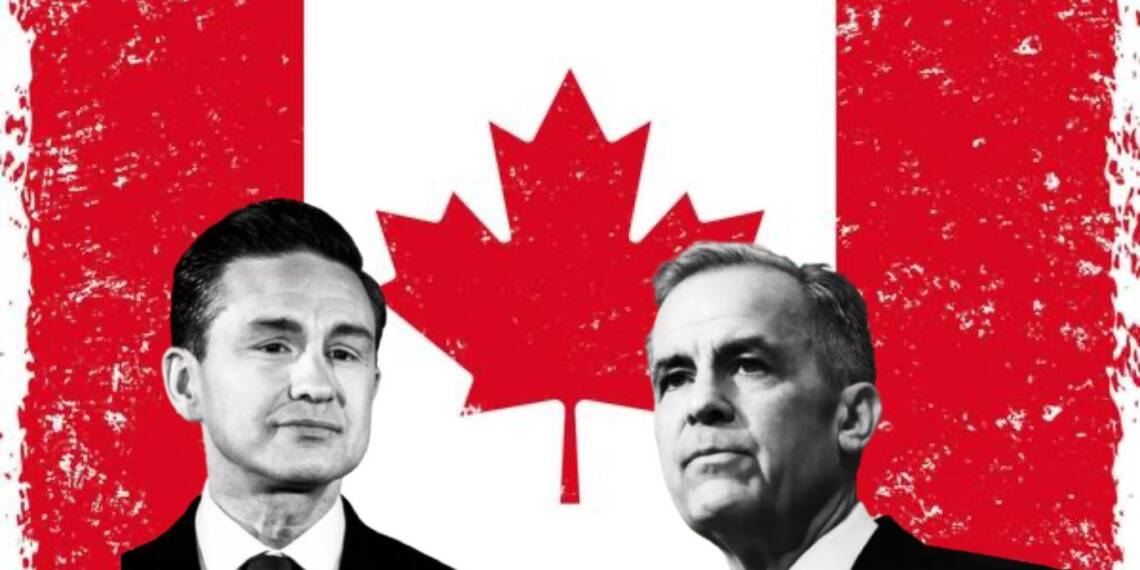Canadians will vote on Monday, April 28, in an important federal election. Liberal Prime Minister Mark Carney will face Conservative leader Pierre Poilievre. The first results will be announced between 7 and 7:30 pm EST, once voting ends in the four Atlantic provinces. Most of the results will be released around 9:30 pm EST.
Canada election follows a long period of political turbulence and mockery of former Prime Minister Justin Trudeau from the US and India, which subsequently led to his surprise and shameful resignation. The law and order situation looks precarious at this movement when the country is ready to go for the poll. A car ploughed into a crowd at a street festival celebrating Filipino heritage in Vancouver on Saturday night, killing at least 11 people and injuring dozens more. Thisis a huge law and order breach just before the Canada election.
What are the polls saying?
Until early 2025, Poilievre’s Conservatives had a big 25-point lead. Trudeau’s government seemed certain to lose. But Trudeau’s resignation in January changed everything. In March, the Liberals chose Carney as their new leader. Carney quickly called for an election. Meanwhile, tensions with the US grew when Donald Trump, after becoming president again, threatened Canada with tariffs and joked about making it America’s “51st state.“ These events helped the Liberals regain support. Now, the Liberals are leading in the polls. From facing total defeat at the start of the year, they are now looking at a possible historic victory.

Let’s look at who is contesting in Canada Election.
Mark Carney
Carney, 60 years old, is the current prime minister and leader of the Liberal Party. He has only been in the role for a few weeks. In early March, more than 85% of his party voted for him to succeed Justin Trudeau. Carney became prime minister soon after Trudeau resigned. Many in Canada and the UK know Carney well. He served as head of the Bank of Canada during the 2008 financial crisis. Later, he led the Bank of England during Brexit. However, Carney is new to politics. He has never been elected before. This election will be his first test in politics.
Pierre Poilievre
Poilievre, 45 years old, is from Calgary, Alberta. He is the Conservative Party’s candidate. He entered politics at 25, becoming one of Canada’s youngest MPs. Over the years, Poilievre has pushed for low taxes and smaller government. He is famous for his aggressive political style. Recently, he attacked the Liberals and Trudeau, blaming their “woke” policies for Canada’s problems. He promises to bring back “common sense politics” if elected. From mid-2023 until March 2025, Poilievre led in the national polls. Many believed the Conservatives would win easily. However, after Trudeau resigned, Trump returned to power in the US, and Carney rose as the new Liberal leader, the race became much closer.
Yves-François Blanchet
Blanchet is the leader of the Bloc Québécois. His party supports a French-speaking separatist movement in Quebec. However, promoting separatism is harder now as Canadians focus more on unity. Blanchet played a big role during Trudeau’s minority government by demanding support on issues like farm aid and pensions. However, the Bloc has recently lost votes to Carney’s Liberals. The idea of Quebec independence, rejected in the 1980 and 1995 referendums, seems less important to voters in 2025.
Jagmeet Singh
Jagmeet Singh is the leader of the New Democratic Party (NDP). He belongs to the Sikh community, which makes up about 2% of Canada’s population but has strong political influence. Singh’s party helped Trudeau’s Liberals stay in power before the 2025 election. However, he later withdrew support to distance himself from Trudeau. Singh had supported Trudeau during his clash with India. After Khalistani terrorist Hardeep Singh Nijjar was killed, Trudeau’s government labelled Indian officials as “persons of interest.” Singh spoke in favour of Trudeau during this time. However, Singh is now struggling. He could even lose his own seat in this election.
In 2013, India denied Singh a visa. Singh had only recently started his political career. His remarks about the 1984 Sikh riots caused controversy because he insisted the term “genocide” should be used. In 2016, he attended a seminar led by a British pro-Khalistan group. He has often appeared at rallies demanding a separate Sikh state.








